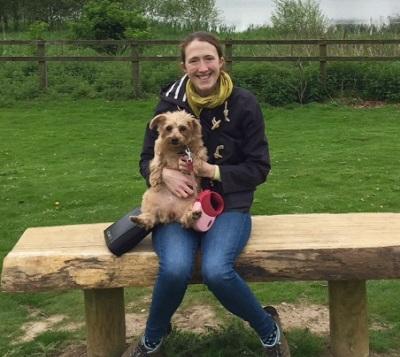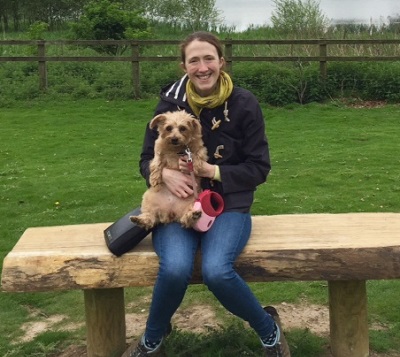Returning to work after a bone marrow or stem cell transplant can be a challenging time - and it varies for every patient. In today's blog, Billie from the Patient Team spoke to three different people about their experiences returning to work: Ian, Jemma, and Brian.
Ian's story: returning to work
When in your post-transplant life did you decide you were ready to think about returning to work?
About four months after my transplant, I was contacted about a project that London Underground was starting the following year.
I still wasn’t ready to go back to work, there was no doubt about that. I wasn’t at that time physically robust enough. It was very difficult for me to be mobile, and I couldn’t go to busy train stations or on long journeys, which I would need to for my job.
My confidence wasn’t there any more either, and I am a very confident person! There were just certain things I didn’t feel up to, like driving by myself. My wife did the driving. I suffered from fatigue, too, so I could get very tired very quickly at short notice.
After about seven months, I started to go to London for the odd meeting, just keeping an eye on the new project that was coming up. By this point I was getting stronger and stronger all the time.
I got more exercise in my garden, digging and planting, and gradually my confidence came back. It took about 12 months.
You mentioned you’ve recently settled back into a part-time role?
Yes, this project is now starting up, and I am in the office all day tomorrow, and will be again next Tuesday. So I am doing two days at home a week and one day in the office.
Do you feel like you’ve been supported by your employer?
I really do. Strictly speaking, I am self employed, so I deal with contracts. They don’t have to employ me at all; they could give me a week’s notice and say, ‘Sorry – due to your condition, it’s not working out,’ but they’ve supported me wholeheartedly throughout. My manager did his utmost to keep me going, and not particularly because of what I bring to the role. They could have got someone else at the drop of a hat, truth be told, but he did it because of his conscience, to support someone who’d worked for him.
Can you tell me a bit about how you felt emotionally returning to work? Is it integral to your identity?
It’s never been a chore to go to work. I used to relish the buzz of being involved in big projects and working with different people across the city. So when I couldn’t work any more, it really was a case of, ‘What am I going to do?’.
When I was physically able to, I focused on getting fitter. I drove my wife mad: digging up a lawn and putting a new one down, laying a new patio, in the attic putting floorboards down. The kind of things I could work at for an hour, and then go to bed for three or four hours afterwards.
Emotionally, I was a rudderless boat, though. I felt sidelined by my condition. So it was a huge boost when I could get back into the office and deal with people as equals again.
The most important thing for me was to get back to having a plan. To know that this week I have this meeting or I’m going to see this person. Having a sense of achievement: to look back on the week and know that something got done, other than watching old episodes of The Sweeney and Minder!
With the highs and lows of post-transplant life, it can be all too easy to slip into a routine of watching daytime TV and doing nothing. And emotionally, that would crucify me.
There were days when it would get to 3pm and I’d think, ‘I haven’t really got going today at all.’ And on those days, you get stuck in your head and into the deep thoughts that don’t bother you when you’re active.
Work took my mind off the enormity of what had happened to me. At the time, you are busy laughing with the nurses, speaking with your consultants, having various tests.
It’s not until three or four months later that you start to realise what happened to you and how serious it was.
Not only for you, but for your family as well.
Jemma's story: returning to work
When did you have your transplant?
I was diagnosed with acute myeloid leukaemia (AML) in June 2012 and I had my transplant in December the same year, around Christmas.
When did you start thinking about returning to work post-transplant?
I started thinking about going back to work during the 2013 summer holidays. I was feeling quite useless, really, as I’d had quite an active career until I got sick.
Sitting around was really frustrating me, so I decided I wanted to try and go back to work.
Did you go back part-time to begin with?
I started back as a teacher two days a week in October 2013. And this September 2016, I’ve now gone up to three days a week.
How did you find returning to work after being at home?
Being a teacher, you can’t hide from anybody, unfortunately!
I was quite self-conscious about my appearance. I still had quite short hair which was curly, and I also had Graft Versus Host Disease (GvHD) that affected my skin, so I had that on my neck. I was still very tired, as well. Being at work and on my feet all day made that worse, and by Christmas that year I was beginning to wonder if I’d made the right choice to go back.
I suffered with anxiety and worried all the time about getting an infection, as I was coming into contact with lots of people.
It sounds like it was emotionally challenging.
Yeah, it was. I was starting to think, ‘Can I actually do this?’ You question your own ability to do it, but I did find over time that I gained a lot more confidence.
But it was daunting to return to the real world after so long.
How did you manage your anxiety?
I tried to find ways to relax and de-stress on my days off, and find strategies to cope.
The main struggle for me has been my ability to concentrate on things. Before treatment I was working all hours, and now I have a cut-off point in the day when I am just gone; I’m no use to anybody then.
That’s not improved over time, sadly, so the fatigue is the hardest part to live with daily.
Do you feel that you were supported by your employer?
Ish! They told me they’d get the rooms deep-cleaned and provide hand sanitiser. I feel it was a bit short-lived, to be honest. I’m sitting in my classroom now and it’s filthy! I can see it’s not been cleaned.
I appreciate it is difficult in this environment; when you are often moving classrooms, it’s difficult to contain. I’ve not actually been ill since I’ve been back, so I’m doing something right! I do try and protect myself as best as I can.
Did your experience of having leukaemia and a transplant change how you felt about your work?
It has. I’d never want to go back to working full-time! This job is rewarding, but I used to devote my whole life to it, and after being ill I just see that there is more to life. It’s an aspect of my life now but not the be-all and end-all.
Family is more important to me now: and going out and trying new things, meeting new people, and having experiences.
I try to live for the day. I do get a bit frustrated by colleagues who see school as their life – life is so precious, and I recognise that now.
Brian's story: returning to work
When did you have your transplant?
I was initially diagnosed in December 2011 with myelodysplasia, and that eventually developed into acute myeloid leukaemia. Following chemotherapy and conditioning therapy, I had my transplant in June 2012.
How are you doing post-transplant?
I had a relapse earlier this year, unfortunately. The leukaemia came back, but it was growing outside the bone. I had another 10 weeks in hospital and I’ve now been given the all clear.
After your transplant, when did you start thinking about returning to work?
It was about a year to 18 months.
Before that, I was still getting very tired, and I was slowly progressing to twice-weekly, then monthly, check-ups at the clinic. I live on the Isle of White, so all my appointments were across the water in Southampton – quite a journey!
Prior to the transplant, I worked in the hospitality industry, but when I was first diagnosed I was actually out of work. So when I started thinking about work again I thought about not returning to that career. I wanted to do something different.
I did an evening college course in administration, to get my brain working again and to boost my confidence.
When you did go back to work, what was your role?
The cancer support centre where I now work had opened in July 2013, and I actually popped in there initially to get advice for myself about returning to work! I also used it to speak to Befrienders for support, and eventually decided I’d like to become a volunteer.
How long did you volunteer before a position came up?
It was six months, and then the role I am in now came up, and I was lucky enough to be accepted. I now give non-clinical support to any Isle of Wight resident affected by cancer.
How did you feel emotionally, getting back into work?
After having over a year off, I was really ready to go back to work. Having had a bone marrow transplant, and feeling that it was a big gift of life, I wanted to help other people. The volunteering position helped me to fulfil that wish, and then to be paid to work at the centre fitted the bill perfectly.
Do you have to manage your energy levels around work?
Yes. I do still get tired and need to have early nights. Work have been very supportive and have allowed me time off for hospital appointments. They’ve been very understanding, especially with my relapse earlier this year.
Do you get a lot from helping other people?
Yes! Living on the Isle of White, a lot of people with cancer go over to the mainland for their treatment, which is something I have first-hand experience of.
I can help them sort out the ferry costs, and how to claim expenses, and all those practical elements that worry you when you are ill. We have volunteer drivers to take some people to their appointments, and that’s one of the areas I coordinate and find rewarding.
For more information about the return to work, read The Way Back To Work – a report featuring more real-life stories from people who’ve been through a stem cell transplant.


